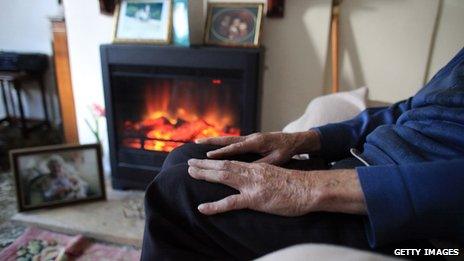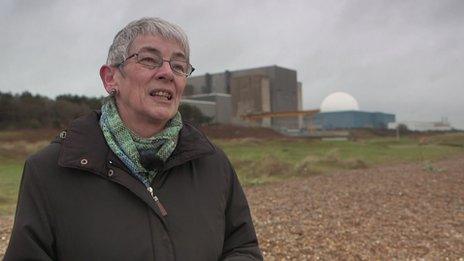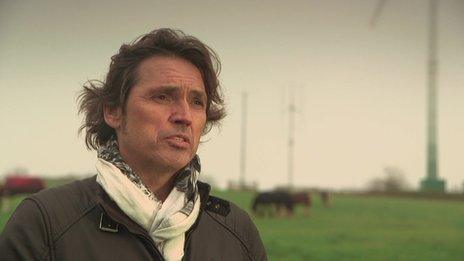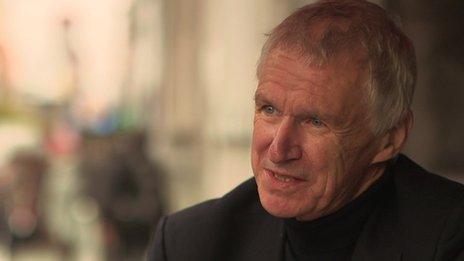Energy: Is there enough competition in the market?
- Published

Rising energy prices have become a big political issue, but is the market really broken?
Britain's energy market is said to be dominated by the Big Six gas and electricity suppliers. For The Editors, a programme that sets out to ask challenging questions, I set out to find out whether there was enough competition between them.
The claim you hear most often about the energy market is it's somehow rigged in favour of the big energy companies.
There's never been any evidence of this, but the perception the market doesn't work as well as it should persists.
Markets need competition, transparency on pricing and genuine choice for consumers.
So does the domestic energy industry tick all those boxes?
After retail energy was opened up to competition in 1998, about 15 suppliers vied to win customers.
Within five years that number had been reduced to six, which has largely remained the case ever since.
Prof Catherine Waddams, from the University of East Anglia, is a leading expert on the domestic energy market and has been studying it closely ever since privatisation.
She told me: "There's some competition in this market - there could be more - it's worrying the way profits have gone up in recent years. We really need to understand what isn't working."
The Big Six suppliers provide about 98% of all household energy and gas. They also control 74% of electricity generation.
Some critics argue this so-called vertical integration, with power generation and retailing joined together, could discourage new players coming into the market.

Prof Catherine Waddams is worried about rising profits
So which industries work better for its customers than energy? Airlines and airports have seen ownership changes and new competitors coming in and cutting fares.
John Fingleton, a former boss of the Office of Fair Trading, told me: "The airline business is incredibly competitive. Customers can compare fares easily, they can switch airlines and new players can enter the market.
"Airlines can switch airports and get better deals. With domestic energy, it's very difficult for consumers to compare prices and for new players to get into the market."
Mr Fingleton wants a full-blown inquiry into domestic energy by the Competition Commission, just as there was a few years ago for the airport industry.
A key challenge is creating a level playing field for smaller competitors.
One of those biting at the heels of the Big Six is Ecotricity, based in Stroud, Gloucestershire.

Dale Vince says it is not easy for his company to make inroads into the market
The founder, Dale Vince, told me signing up customers was not easy.
He said: "The switching process is complicated, sometimes unnecessarily so. It's probably flawed from a customer point of view because the Big Six can make things very difficult."
Mr Vince said the complex systems regulators require energy retailers to have can deter smaller companies.
Those systems required between £2m and £3m of investment, he said, whereas his start-up costs in the 1990s had been only about £10,000.
I was shown around Eon's gas-fired generation plant at Enfield in north London by director of strategy and regulation Sara Vaughan, who said retail customers could see easily what sort of deals they were getting in comparison with other offers.
She said Eon had a clear internal split between its generation activities and supplying households.
But her company accepted a full independent inquiry was the only way to test whether the market really was working and restore the trust of consumers.
She said: "Trust has to be earned - it lies behind our call for a Competition Commission inquiry. We want to show people we are open and we are really prepared to have an organisation come in and look into our business."

Philip Lowe, of the European Commission, says lack of competition is a problem across the EU
But are things any better elsewhere in Europe?
In Belgium, Germany and the Netherlands, competition is seen as more effective than in the UK, partly because their markets are more connected, though in others it's a different story.
In Brussels the European Commission's top energy regulator, Philip Lowe, told me there was a problem across the EU.
He said: "The UK situation is mirrored elsewhere and is worse elsewhere because there are fewer competitors in the market.
"Some national markets have only one supplier.
"But it's not enough to just have more than one supplier.
"You actually need the information to make an intelligent choice on switching."
In my conversations with experts I heard no argument in favour of the domestic energy market or any claim it was working well.
But there was a clear view there were no quick fixes available to politicians.
There is growing pressure for a robust competition inquiry, though this could take a couple of years.
Questions are being asked over whether consumers across Europe get a fair deal. While wholesale energy prices rise, the debate will get noisier.
But making the market work better could require unplugging the industry's complex structure and rebuilding it.
Hugh Pym explains how the Big Six work and asks if the energy market is competitive
BBC News: The Editors features the BBC's on-air specialists asking questions that reveal deeper truths about their areas of expertise. Watch it at 23:20 GMT on Monday 25 November on BBC One (except in Wales or Northern Ireland) or later on on the BBC iPlayer.